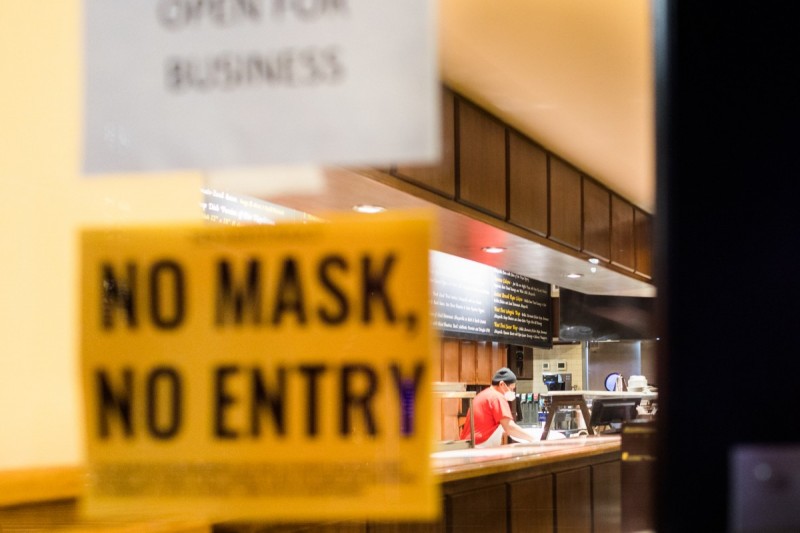A carrot for the bosses and the stick for the workers

Workers have been reluctant to return to work and risk exposing themselves and their families to infection because of the relative security that the Canada Emergency Relief Benefit (CERB) offered. Photo from Flickr.
The dominant public discourse in this society is based on the proposition that the rich need incentives, while workers and poor people must be disciplined. Income support for those outside the workforce has always been provided reluctantly and inadequately, while state handouts to employers and corporations are always lavish and provided with very few conditions. The response of the Trudeau government, in the face of the pandemic lockdown, is no exception to this longstanding approach.
Finance Minister Bill Morneau has now told us that the Canada Emergency Relief Benefit (CERB) will be ending in September. Implying that those forced to turn to this benefit have been kept in a state of pampered dependency, Yahoo Finance reports that “Canadians must now prepare to wean themselves off the popular CERB program.” At the same time, however, employers, far from facing any “weaning” process, are to have their benefit system extended and enriched. As he announced the end of the CERB, Morneau also informed us that the Canada Emergency Wage Subsidy (CEWS) will continue until at least December and the rules will be relaxed to ensure there is even more room at the trough. Up until now, in order to have 75 percent of its wage bill covered out of public monies, a company would have to show a 30 percent decline in revenues, but this condition will now be dropped and the change will be retroactive to July 5.
Lockdown impacts
CERB had to be hastily improvised in conditions of pandemic-induced dislocation because the established system of social benefits in Canada has been decimated by a decades-long austerity agenda. Allegations that it is a lavish or generous form of emergency provision are entirely preposterous. It has only blunted, rather than alleviated, an explosion of hardship and hunger that has developed during the pandemic lockdown and that will continue in the conditions of mass unemployment that follow it. Three million jobs were lost in Canada during March and April and a further two-and-a-half million workers had their hours of work reduced. The unemployment rate of 13.7 percent that was reported on June 5 had still only fallen to 12.3 percent as of July 10. This is hardly an indication that there is no longer a need for emergency provision measures.
Food insecure Canadians numbered 4.4 million even before the pandemic, and the months of lockdown have made that much worse. Between mid-March and the end of April food bank use across the country tripled. So many tenants have been unable to pay their rent during the lockdown period that the threat of mass evictions and an explosion of homelessness hangs over many communities. In Toronto, it is estimated that up to 260,000 people could be “delinquent” in their rent. A brief prepared by the Toronto Foundation affirms that, “Considering that the Landlord Tenant Board typically sees 4,000 eviction cases a month across the entire province, the scale of this issue compared to the typical is unprecedented.” This is the context in which the Trudeau government will be “weaning” people off the CERB, which provides $2,000 a month (with a maximum of 24 weeks of benefits), when the average rent for a one-bedroom apartment in Toronto is $2,300.
The fact that the CERB has not been nearly sufficient to prevent enormous hardship across Canada during the lockdown period has not inhibited the emergence of a veritable campaign for its destruction. In an interview with CTV News, Dan Kelly, president of the Canadian Federation of Independent Business, expressed concern that workers were too reluctant to return to work and risk exposing themselves and their families to infection because of the relative security that the CERB offered. His organization suggests that a third of employers may be having trouble convincing workers to take such risks. Leah Nord, of the Canadian Chamber of Commerce, expressed similar concerns and suggested that, “We need to instil confidence in employees that they are safe to return to work.” Presumably, knowing that the alternative is to go hungry and risk loss of housing will ensure that such confidence is generated. Postmedia’s John Ivison was even less subtle, and wrote a column warning that “Trudeau’s lavish handouts risk turning workers into welfare slackers.” Conservative leader Andrew Scheer predictably took a kick at the can as well: “At a time when our economy needs stimulus, Justin Trudeau has given it a tranquilizer and risks creating labour shortages across the country. This failure must be reversed before it is too late. Canada’s economic recovery depends on it,” he told the media.
Income support
The termination of the CERB along with the campaign of character assassination that preceded this move are instructive when it comes to understanding the role of income support in a capitalist economy. The basic function is to provide enough income to stave off unrest and social dislocation while ensuring it is not ample enough to interfere with the supply of low-wage workers. In the unique conditions created by the pandemic and resulting economic crisis, the state had to improvise. A level of pubic health and stability had to be ensured, but with the push to reopen gathering momentum, the temporary and very reluctant measure that was the CERB is an obstacle. Workers must be ready to risk the consequences of returning to the workplace despite the continuing risks of catching the coronavirus, and the only recourse will be the austerity-impaired EI and provincial social assistance systems.
Since the pandemic lockdown took effect, there have been calls for a move towards a system of basic income. I remain an opponent of this policy option and I have spelt out the basis for my position in an earlier article for Canadian Dimension. In my view, the early demise of the CERB and the readiness of the Trudeau government to focus on the provision of wage subsidies for employers supports the arguments I made in that article. However, what is abundantly clear is that a fight for a strengthened income support system in Canada, linked to a whole series of struggles that workers and communities must take up, lies before us as an absolute necessity.
No one is at all sure how effectively COVID-19 will be contained in the coming months and how many more waves of infection we will have to contend with before the pandemic is over. Prospects for a rapid “V-shaped” economic recovery are dim. Large scale unemployment will be a reality for an extended period. The temporary suspension of evictions that provinces have enacted is about to end. Huge cuts to social programs and vital public services are looming. In Toronto, Mayor John Tory is threatening austerity measures on the level of a doomsday scenario unless the higher levels of government agree to bail out the municipality.
The elimination of the CERB and the decision to give priority to the allocation of public funds in the form of handouts to employers can be taken as a measure of the Trudeau Liberals and, more broadly, as the political writing on the wall. We are entering a period of crisis that is simply without precedent and the course the federal government is pursuing shows a clear intention to ensure that working class people will pay for that crisis, while corporations are cushioned and supported by the state. Unions and communities will have to respond to this with a united fightback against attacks on workers’ rights and public services. They will have to challenge welfare schemes for the rich and demand the right to adequate and secure income for all.
John Clarke is a writer and retired organizer for the Ontario Coalition Against Poverty (OCAP). Follow his tweets at @JohnOCAP and blog at johnclarkeblog.com.










